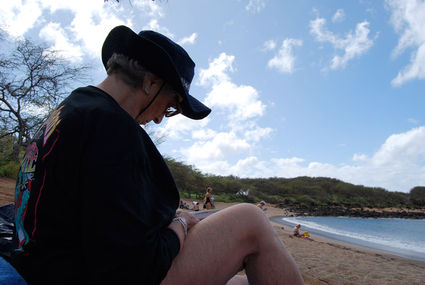Connecting with a parent through travel

Dimitra Lavrakas photo
Ann Lavrakas enjoys what she loves doing the most on her vacation to Molokai, Hawaii – reading on the beach.
I have traveled with my mother when she was sighted and then not, and I wish this book, "Planes, Canes and Automobiles," had been available to me after she was hit with temporal arteritis, a rare autoimmune disease where the temporal arteries are destroyed, often causing blindness.
The author, Valerie M. Grubb, first started traveling with her mother when she was 64 and continued for the next 20 years.
It's true that as we age we become more set in our ways, so making travel plans with someone in their late 70s or 80s presents quite a challenge.
Parents can be easier to travel with when they're in their 70s than when they are a decade older. Grubbs advises at that decade to make sure as much of the details are completed so the parent only has to pick up their bags and get on the plane. Oftentimes they will feel overwhelmed by the mere suggestion that they alter their daily routine, she writes.
But make sure to get a parent's input on what they want or can do when traveling.
For instance, Grubb discovered her mother must have eggs for breakfast, and there was no negotiating on this, and she takes an average of one hours and 15 minutes to eat any meal or snack - something Grubb, who likes to dash off in all directions when in a new location, had to resign herself to.
She also points out to save the marathon sightseeing for a time when traveling with friends.
Test the waters
Grubb suggests taking a "mini-trip" to a nearby destination to see what services parents may need-handicap-accessible rooms and showers, special meals due to dietary restrictions. Does your parent have to travel in a wheelchair or bring a portable oxygen concentrator? These are logistics that you have to deal with, and Grubb has pages of helpful contacts and websites to help you plan a smooth vacation.
Packing, always the bugaboo of travel, is made simple by this book. In the light that airlines now charge for luggage and then lose it, it's best to travel with carry-ons or a small suitcase, which she recommends you fill with clothing that can be layered for warmth or heat. For a wrinkle-free look on arrival, she advises to pack cotton knits or blends, wool and cashmere, 100 percent nylon or polyester knits, most sweaters, and denim.
If you fill up your bag, leave a few items behind. After all, they do have stores where you're going.
Traveling with mobility and health challenges
If a wheelchair is needed but not all the time, airports now provide wheelchair service, as do most hotels.
"The key," Grubb writes, "to enjoying a vacation with an aging parent (or anyone, really) is to relax and take it slow. How many times have you gone on an action-packed vacation only to return home as exhausted - or more so - than when you left?"
Grubb recommends cruising for parents with mobility issues because cruises offer a huge variety of things to do, all in an enclosed, safe environment.
And don't forget medications that cannot be skipped, bringing along a prescription in case it runs out or is lost. And do carry medications on your person - again, in case the airline loses your bags.
There is also a section on traveling with parents with dementia, where Grubb recommends having another adult travel along to switch off on "parent duty," and to determine when the best time of day for them to travel. A person with dementia often suffers "sundown syndrome" in the late afternoon and evening, when their symptoms become more acute.
Travel insurance, as is medical travel insurance, is recommended so the money can be refunded if a parent has a medical condition that might require cancelling the trip.
Using credit cards instead of debit cards is an added security measure if the debit card is hacked.
Instant respect
I found that in many cultures traveling with a parent makes you special in their eyes as it shows you revere family ties as they do.
In her 70s, my mother and I traveled to Hawaii several times and I found that locals were extra helpful and more congenial than when I traveled there with friends.
Those vacations with her were to help her distress from being a caretaker for my father, so the most adventurous thing we did was take a sunset cruise or a whale watch, the rest of the time we fell into a routine of going out for breakfast to a newly found, favorite place, going to the beach or driving around looking at the scenery. We returned to our daily lives renewed and the next year we did it again.
I highly recommend it and this book.







